|
|
|
Sort Order |
|
|
|
Items / Page
|
|
|
|
|
|
|
| Srl | Item |
| 1 |
ID:
124049
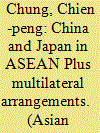

|
|
|
|
|
| Publication |
2013.
|
| Summary/Abstract |
Interactions between China and Japan in multilateral "ASEAN plus dialogue partners" forums--the economic groupings ASEAN Plus Three and East Asia Summit, and the security groupings ASEAN Regional Forum and ASEAN Defense Ministerial Meeting Plus--have moved from attempts at cooperation, to competition for influence, and thence to attentiveness or disinterest.
|
|
|
|
|
|
|
|
|
|
|
|
|
|
|
|
| 2 |
ID:
187426
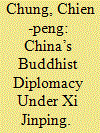

|
|
|
|
|
| Summary/Abstract |
China’s burgeoning economic and security activities abroad have given rise to suspicions and criticisms of its intentions. As Buddhism is a shared faith and heritage among many Chinese; an integral part of national identities of Sri Lanka, Myanmar, Thailand, Laos, and Cambodia; a proud legacy in India; and a major religion in Vietnam, Malaysia, Singapore, Mongolia, Korea, and Japan, winning over the trust and friendship of neighboring Buddhist countries has emerged as an important Chinese diplomatic initiative, especially under the current Xi Jinping leadership’s enterprise to revive the Silk Road. Having over 245 million Buddhists, 28,000 Buddhist monasteries, 16,000 temples, and 240,000 Buddhist monks and nuns makes the promotion of Buddhism a rich source of soft-power, or “soul power,” for China, generated from its heavy investments in building Buddhist institutions and engaging Buddhist groups in these countries. However, there are external and domestic challenges in using Buddhism as a Chinese foreign policy vehicle. The paper analyzes what the objectives of China’s Buddhist diplomacy are; which personnel, organizations, or state bureaus in China make China’s Buddhist diplomacy; how is it carried out; what the targeted institutions and personnel in the affected countries are; the reactions from these countries; and the extent to which a Communist regime is able to carry out its promotion of Buddhism in Asia despite its professed atheism. The analysis is conducted through the spectrum of two major perspectives in international relations literature: neo-realism and constructivism.
|
|
|
|
|
|
|
|
|
|
|
|
|
|
|
|
| 3 |
ID:
152981
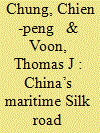

|
|
|
|
|
| Summary/Abstract |
This article focuses on China’s Maritime Silk Road initiative, paying particular attention to Southeast Asia, the initiative’s key focus. It examines the political and economic costs and benefits of participation in the initiative for Southeast Asian countries, and identifies the rationales that may enhance or diminish the initiative’s success.
|
|
|
|
|
|
|
|
|
|
|
|
|
|
|
|
| 4 |
ID:
112626
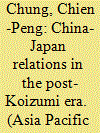

|
|
|
|
|
| Publication |
2012.
|
| Summary/Abstract |
The tenure of Japanese Prime Minister Junichiro Koizumi (2001-2006) was vexing for China-Japan relations. As such, the five years since Koizumi left office, particularly the change in Japan's ruling party, were initially expected, and sometimes perceived, to realize a half-decade of recovery and reconciliation in Sino-Japanese ties. While tensions did decrease, "icebergs" blocking improvement in relations have not completely thawed, and may harden again. Competition for political and economic influences and interests in the same region, concern over one another's future security posture and relations with Taiwan, territorial disputes, misunderstanding about the other's historical sensitivities and feelings of distrust, occasionally manipulated by nationalists, still pervade the relationship. Therefore, though there is mutual desire, indeed a necessity, for cooperation on many issues affecting both countries, this typically couples with a disconcerting or anxious feeling towards the other's intentions that results in competitiveness. There are deep roots to this need/fear complex.
|
|
|
|
|
|
|
|
|
|
|
|
|
|
|
|
| 5 |
ID:
088514
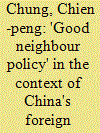

|
|
|
|
|
| Publication |
2009.
|
| Summary/Abstract |
China's push for regional integration is an attempt to increase its influence throughout its neighbourhood and exhort other states to adopt its state-centric "New International Order" model of conducting foreign relations. The Chinese leadership will look for opportunities for co-management of world and Asia-Pacific economic, financial, security and diplomatic affairs.
|
|
|
|
|
|
|
|
|
|
|
|
|
|
|
|
| 6 |
ID:
067019
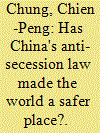

|
|
|
| 7 |
ID:
105216
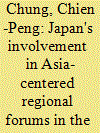

|
|
|
|
|
| Publication |
2011.
|
| Summary/Abstract |
Against China's attempts at cultivating multilateral forums to augment and institutionalize its influence in Central, Northeast, and Southeast Asia, Japan's major foreign policy challenge now is how to secure its own interests in these forums while balancing its relations with China and the United States.
|
|
|
|
|
|
|
|
|
|
|
|
|
|
|
|
| 8 |
ID:
083359
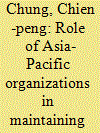

|
|
|
|
|
| Publication |
2008.
|
| Summary/Abstract |
There are two regular regional security organizations in Asia-the Shanghai Cooperation Organization (SCO) and ASEAN Regional Forum (ARF)-through which regional states are involved in managing security pertaining to Eurasia and the Asia-Pacific, respectively. Since 2001, Asia-Pacific Economic Cooperation (APEC) leaders' meetings have addressed aspects of economic security. Whereas the SCO seems well institutionalized and purposeful, the ARF appears weakly structured and ineffective. This is because, while member states of the SCO are generally trustful of one another and hold in common most security objectives, concerns, and norms in the organization, many member states of the ARF have uneasy relations among themselves and share few security objectives, concerns, and norms in the forum. Moreover, while the SCO represents priority multilateral foreign and security policy interests for the People's Republic of China (PRC) and Russia, its two most important constituents, the ARF represents a secondary or fall-back position for the bilateral-first foreign and security policy relations of its major players like Japan, United States, and the PRC
|
|
|
|
|
|
|
|
|
|
|
|
|
|
|
|
| 9 |
ID:
060326
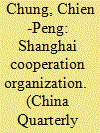

|
|
|
| 10 |
ID:
157477
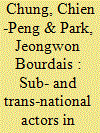

|
|
|
|
|
| Summary/Abstract |
This paper provides a political analysis on two territorial disputes that South Korea has with Japan over Dokdo/Takeshima and with China over Iŏdo/Suyan Rocks, as well as on their implications for the Northeast Asia region, focusing on the roles of sub-state actors and the United States as a third party trans-national actor. It mainly explores why South Koreans consider territorial claims by Japan and China such an affront as to require strident demonstration of ownership, especially since they already exercise effective control over the territories under dispute. It also explores what actions the South Korean government would take in the event of maneuvers or attempted landings by security forces or nationalists/fishing boats from China on Iŏdo or Japan on Dokdo. Employing Robert Putnam's Two Level Game Framework, the paper provides comparative insights on how these cases have been developed to date through interactions between Level I, official negotiators, and Level II, sub- and trans-national actors. The two cases demonstrate that the state is not a unified actor, and non-state actors' nationalistic collective sentiment has played (and will play) a greater role in shaping the directions of (potential) conflicts over Dokdo and Iŏdo.
|
|
|
|
|
|
|
|
|
|
|
|
|
|
|
|
| 11 |
ID:
090169
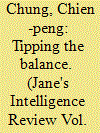

|
|
|
|
|
| Publication |
2009.
|
| Summary/Abstract |
The ethnic violence that killed at least 197 people in Urumqi, capital of China's Xinjiang Uighur Autonomous Region (XUAR),
in early July is a stark reminder of the centrifugal forces pulling at China's centre.While China's overwhelming security forces were able to end the violence, the unrest highlighted the widespread discontent among the Uighur population in the XUAR, The once-majority Uighurs remain disconcerted by the migration of Han Chinese to the western region, which threatens to overwhelm them demographically and culturally.
|
|
|
|
|
|
|
|
|
|
|
|
|
|
|
|
| 12 |
ID:
158636
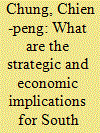

|
|
|
|
|
| Summary/Abstract |
This article focuses on South Asia's role in China's Maritime Silk Road (MSR) initiative. Given the saliency of this MSR enterprise as part of ChinesePresident Xi Jinping’s “One-Belt-One-Road” strategy, how this ambitious scheme impacts China’s relations with South Asian states along the MSR’s route, i.e. India, Pakistan, Sri Lanka, Maldives and Bangladesh, merits investigation. The fate of the MSR will be determined by China’s relations with these states, since South Asia is in the middle of major sea-lanes between East/Southeast Asia and Middle East/Europe. The study examines the intentions and executions of China’s MSR projects in South Asia, evaluates the political and economic calculations of participating in the MSR for regional states, and identifies actions taken by them that can decide the initiative’s success. Politically, reactions of South Asian states to the MSR are explained as: fear of expanding Chinese influence in the Indian Ocean for India; and attempts by which Pakistan, Sri Lanka, Maldives and Bangladesh use China to counteract possible domination by India. Economically, two MSR pathways for South Asian states are analyzed: increases in Chinese infrastructure investments; and expansion in South Asia-China trade; both of which are reducible by loans owed to China, or “strings”/conditions attached.
|
|
|
|
|
|
|
|
|
|
|
|
|
|
|
|
|
|
|
|
|